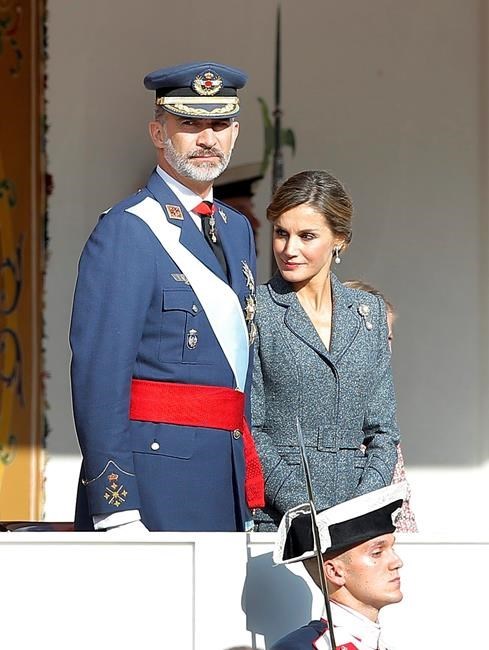
Spain's King Felipe and Queen Letizia attend a military parade during a national holiday known as "Dia de la Hispanidad" or Hispanic Day, in Madrid, Spain, Thursday, Oct. 12, 2017. King Felipe VI is to preside over the annual colorful parade Thursday as Spain awaits a response to a government request to Catalonia to clarify by Monday if it has already declared independence, in which case Spain warns it may begin taking control of the region. (AP Photo/Paul White)
Republished October 12, 2017 - 7:18 AM
Original Publication Date October 12, 2017 - 12:46 AM
MADRID - Thousands of Catalans who want their region to remain in Spain marked the country's national day Thursday, marching through Barcelona waving both Spanish and Catalan flags and shouting "I am Spanish," as the region's threats of independence have left the country in crisis.
Meanwhile, in the national capital Madrid, troops and police paraded in front of King Felipe VI, accompanied by national and regional politicians. Thousands of people waving Spanish flags lined the sidewalk of Madrid's Paseo de la Castellana avenue for the military parade.
The pilot of a fighter jet taking part in the Madrid parade died when the plane crashed while landing at a base in Albacete, some 300 kilometres (200 miles) southeast of the Spanish capital, authorities said.
In Barcelona, Catalonia's capital, a crowd of people that local police said numbered 65,000 marched to a central square, some with their faces in the red and yellow colours of both the Spanish and Catalan flags and shouting "Viva Espana" — "Long live Spain."
"We are now feeling that years of threats by separatists have turned into an attempt to normalize social division," said Juan Jose Garde, a 63-year-old retired civil servant who was joining a national day march for the first time after years of enjoying the holiday by taking his family to the beach.
For many others, Thursday's march in central Barcelona was also a first.
Montse Sanchez, a 56-year-old Catalan bank clerk, said she only felt the urge to protest when the separatists' bid recently became "an imposition of thought."
"They want to impose on us the ideas of one, but in Catalonia we are more than one, we are many people with very different feelings toward nationality," she said.
The slogan of the march was "Yes to Catalonia. Spain, too," supporting Catalan autonomy, but within Spain as a whole.
Two small groups of protesters clashed as the unionists' demonstration was getting underway, throwing chairs and bottles taken from a cafeteria terrace at each other. An officer was injured when local police intervened to separate them, Barcelona's urban guard said.
It was unclear what sparked the violence or who was involved, but the main demonstration led by civil society groups opposing the separatist bid in Catalonia wasn't disrupted.
A separate protest of around 200 supporters of far-right and Spanish nationalist groups ended at Barcelona's Montjuic hill with speeches and the burning of an "estelada" the unofficial flag that has become a symbol for Catalan separatists.
Catalan regional President Carles Puigdemont announced Tuesday that he was proceeding with a declaration of Catalan independence, but proposed freezing its implementation for a few weeks to allow for dialogue and mediation with the national government in Madrid.
Speaking in the national parliament Wednesday, Prime Minister Mariano Rajoy asked Puigdemont to clarify whether or not he had actually declared independence, adding that the Catalan leader's response would be crucial in deciding "events over the coming days." He hinted that Spain could take control or partial control of Catalonia under an article of the Spanish constitution.
In a tweet later, Puigdemont reacted: "We demand dialogue and the response is to put article 155 on the table. Message understood."
Puigdemont's deputy, Catalan vice-president Oriol Junqueras, also tweeted: "A sincere dialogue is what the international community wants and what Catalonia expects, not confrontation and new threats."
Opposition Socialist leader Pedro Sanchez, who is backing Rajoy's government in its response to the separatist's defiance, said Thursday that the crisis "has solution and there is hope."
"We want dialogue, dialogue about how Catalonia remains in Spain and not about how it leaves Spain," Sanchez said in an interview with Cadena Ser radio.
Thursday's holiday is known as Dia de la Hispanidad, or Hispanic Day. It commemorates Christopher Columbus' arrival in America and is also Spain's armed forces day.
Regional leaders are invited to attend the Madrid parade but for many years officials from the Basque and Catalan regions, where independence sentiment runs high, have boycotted it.
Several town halls in Catalonia have said they will ignore the holiday and work as normal.
About 2.3 million Catalans — or 43 per cent of the region's electorate — voted an independence referendum Oct. 1 even though it was banned. Catalonia said 90 per centfavoured secession and it declared the results valid. Opponents boycotted the vote.
The day was marred by violence as police under court orders tried to prevent voting taking place. A Human Rights Watch report released Thursday said Spanish police used excessive force when they faced peaceful protesters on the day.
Polls indicate that Catalonia's 7.5 million residents are evenly divided over secession. The region contributes a fifth of Spain's 1.1 trillion-euro ($1.3 trillion) economy.
_____
Parra contributed from Barcelona, Spain.
News from © The Associated Press, 2017